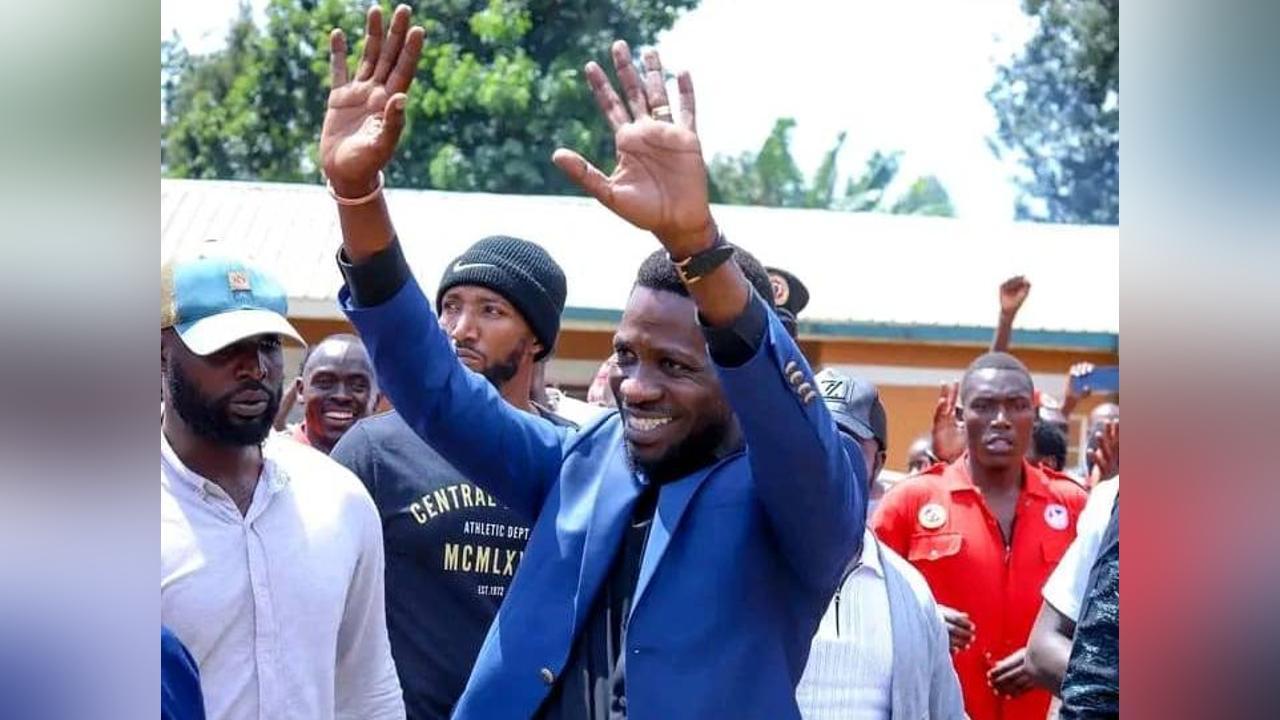Africa-Press – Uganda. National Unity Platform (NUP) president Robert Kyagulanyi, popularly known as Bobi Wine, issued a strong call for unity and cooperation within the party’s ranks in western Uganda following a thwarted visit to Fort Portal city.
His message, delivered to regional NUP leaders in a hastily arranged meeting at Kabundaire SDA Secondary School, emphasized the urgent need for collaboration over internal competition and a rejection of tribal and sectarian divisions.
The meeting, a consequence of Police action that prevented Kyagulanyi and his entourage from entering Fort Portal, saw the NUP leader engage with party officials from the Kigezi, Ankole, Bunyoro, and Tooro regions.
The unexpected venue underscored the challenges faced by the opposition in accessing certain areas of the country, highlighting ongoing political tensions.
Witnesses reported a heavy police presence surrounding the city, preventing what was anticipated to be a large-scale public rally.
“Our presence here today is not a matter of convenience but a testament to our commitment to strengthening our party in this region,” Kyagulanyi declared to the assembled leaders.
“The events of today, while frustrating, have only served to highlight the importance of our collective effort. We cannot afford to be divided; we must stand united against the forces that seek to suppress our voices.”
Kyagulanyi’s address focused heavily on the need to overcome internal divisions fueled by the pursuit of positions within the party structure.
He expressed concern that infighting and a focus on personal ambitions were undermining the party’s overall strength and its ability to effectively represent the interests of the people in western Uganda.
“I have observed with concern the internal bickering and competition for positions within our party,” he stated.
“This infighting distracts us from our core mission: to serve the people of Uganda and build a better future for all. We must prioritize the collective good over individual ambitions. Let us work together, not against each other.”
The NUP leader’s words resonated with the gravity of the situation. The party’s struggle for influence in western Uganda, a region traditionally considered a stronghold of the ruling National Resistance Movement (NRM), is well-documented.
While NUP has made inroads in recent years, consolidating its presence and overcoming internal divisions are crucial for sustained growth and future electoral success.
Kyagulanyi’s call for unity extended beyond internal party matters, addressing the broader societal issue of tribalism and sectarianism.
He argued that these divisive forces are obstacles to national unity and hinder the party’s ability to build a truly inclusive and representative political movement.
“Tribalism and sectarianism are cancers that eat away at the fabric of our society,” he stressed.
“They divide us, weaken us, and prevent us from working together for the common good. As NUP leaders and supporters, we must actively reject these destructive forces. We must stand together, regardless of our tribe or background, united in our pursuit of a better Uganda.”
The meeting at Kabundaire SDA Secondary School provided a platform for open dialogue and the exchange of ideas among regional NUP leaders.
Reports suggest that Kyagulanyi engaged in extensive consultations, listening to concerns and addressing questions from the various regional representatives.
The impromptu nature of the meeting, forced upon them by the police intervention, arguably strengthened the sense of urgency and shared purpose among the attendees.
The shared experience of being denied access to Fort Portal city likely fostered a sense of solidarity and a collective commitment to overcome the challenges ahead.
However, the incident also raised concerns about the limitations placed on political activity and freedom of movement in Uganda.
The police’s actions in preventing Kyagulanyi’s access to Fort Portal city highlight the ongoing tensions between the ruling party and the opposition, with implications for the political landscape in the run-up to future elections.
The NUP’s strategy for Western Uganda will be critically important in determining the party’s national standing.
Securing significant support in this region could potentially shift the balance of power in future elections.
However, overcoming the challenges of internal divisions and the pervasive influence of tribalism and sectarianism will require sustained effort and a commitment to inclusivity from all levels of the party.
Following the meeting, several NUP leaders expressed their support for Kyagulanyi’s call for unity and cooperation.
They acknowledged the need to overcome internal divisions and work collaboratively to build a stronger party presence in western Uganda.
However, the long-term success of this call for unity will depend on the willingness of individual leaders to put aside personal ambitions and prioritize the collective good of the party and the people they represent.
The events in Fort Portal underscored the complexities of Uganda’s political landscape and the ongoing struggle for political space by the opposition.
While the Police action prevented Kyagulanyi from holding his planned rally, the subsequent meeting at Kabundaire SDA Secondary School provided a platform for a crucial message of unity and a renewed focus on overcoming internal divisions and promoting national reconciliation.
Whether this message will translate into tangible changes within the party’s structure in western Uganda remains to be seen, but the urgency of Kyagulanyi’s call cannot be overlooked.
The future success of the NUP in western Uganda, and indeed nationally, may hinge on the party’s ability to effectively address these internal challenges and build a truly unified front.
The road ahead is undoubtedly challenging, but the call for unity offers a potential pathway towards a stronger and more effective NUP in the years to come.
The coming months will be crucial in determining whether the party can successfully navigate these internal divisions and consolidate its support base in western Uganda.
The success or failure of this effort will have significant implications for the future of Ugandan politics. The eyes of the nation, and indeed the international community, are watching.
For More News And Analysis About Uganda Follow Africa-Press






